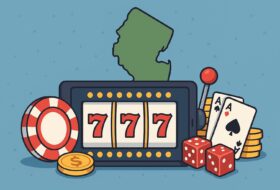
The anticipated Apr. 4 launch of online gambling and sports betting in Ontario has produced a lot of excitement. However, the impending launch also has a few prominent legal questions swirling.
Among the most prominent voices opposing the launch have been several First Nations groups; most notably, the Mississaugas of Scugog Island First Nation (MSIFN). The retail sector is another source of dissent, and even the province’s own Auditor General has concerns about the market’s legality.
The MSIFN has indicated that they intend to file a lawsuit challenging the expanded online gambling push. Other, similar legal challenges could come from other First Nations groups, including from the Mohawk Council of Kahnawá:ke (MCK) and the Six Nations of the Grand River (SNGR).
These First Nations have expressed concerns over the provincial government usurping jurisdiction over gaming. Retail operators also fear the impact legalized iGaming will have on their business.
There are also questions about bringing over gray market operators, and what to do about any who fail to comply.
By far the most important legal question casting a shadow over an April launch is the aforementioned Auditor General’s report from December 2021. The Auditor General’s Office conducted analysis and concluded that the planned launch appeared incompatible with the requirement that gaming be “conducted and managed” by the province.
Articles in this series
- I: The Canadian Status Quo
- II: The Goal And The Approach
- III: The Major Players
- IV: The Revenue Question
- V: Marketing Considerations
- VI: Legal Challenges
- VII: Canada’s Future
The MSIFN challenge
One of the most staunch opponents of expanded sports betting and iGaming in Ontario has been the MSIFN. The MSIFN, who filed a brief in hearings over the repeal of the single-game betting prohibition within the Criminal Code, noted that the federal and provincial governments have a constitutional obligation to engage in “meaningful consultation to Indigenous governments prior to enacting legislation to legalize sports bookmaking.”
Following the repeal of the the sports betting prohibition, the MSIFN has continued its opposition to privatized gaming expansion. The MSIFN has repeatedly claimed that the Ontario Premier Doug Ford government’s proposed plan is unconstitutional, in the group’s view. In addition, MSIFN Chief Kelly LaRocca has argued that the online gambling launch has lacked the necessary consultations with First Nations communities.
Section 35 of the Constitution guarantees the treaty rights of First Nations and Inuit people of Canada, which includes protection of cultural practices. The MSIFN argues that gambling is included in these cultural practices. In addition, the MSIFN has claimed that the privatized launch threatens their economic development. Finally, the MSIFN has noted their intention to challenge the Ontario launch in court. However, to date, no known suit has been filed.
Other First Nations’ opposition
In addition to the MSIFN, the Shawanaga First Nation has voiced that the proposed regime violated the Robinson Huron Treaty of 1850. The Shawanaga First Nation’s opposition followed a court ruling. The court found that the Ontario Lottery and Gaming Commission had breached a prior revenue-sharing agreement with various First Nations groups.
In February 2022, MCK and SNGR entered a cooperation agreement on gaming. Among the critical provisions in the announcement was the intent to defend “Indigenous jurisdiction over gaming.”
Expressing frustration over the coming changes, the SNGR press release about the agreement stated:
Both communities have been frustrated by recent changes to Canada’s Criminal Code that have effectively shut out First Nations by willfully ignoring the legitimate interests of Indigenous Peoples in the gaming industry. This is being clearly demonstrated by the recent actions of the government of Ontario, which has unilaterally reinterpreted the ‘conduct and manage provisions of the Criminal Code of Canada and established an ‘igaming’ initiative under its authority, iGaming Ontario. This new model does not provide accommodations for, and will not benefit SNGR or Kahnawà:ke’s socio-economic business, Mohawk Online, as it closes off access to one of its largest local markets. (emphasis in original).
The agreement comes after voiced opposition to Ontario’s plan went without a response from provincial officials.
Despite its opposition to the launch, it seems likely that Entain’s recent acquisition of Sports Interaction – a Mohawk-regulated brand – will mean that it ceases operating in Ontario. Any continued activity there would potentially jeopardize the registrations of Entain’s other brands.
Indeed, operating without registration could see the company face consequences in the US, as well. That would depend on how state regulators see the situation.
The land-based opposition
The Great Canadian Gaming Corporation (GCG), one of the largest casino operators in the country, has expressed concerns of its own. GCG commissioned an analysis of the proposed market from HLT Advisory Inc.
The study’s dire predictions include claims that regulated online gambling in Ontario could cost the province more than 2,500 jobs. It also forecasts the loss of millions in contributions to local governments, and billions in provincial revenue.
The statistics produced by the HLT report are jaw-dropping. However, it is unclear if the casino operator intends to challenge the launch in court. The study has also attracted substantial criticism from industry experts and the Canadian Gaming Association itself. Its findings lean heavily on using the United Kingdom in 2005 as a case study.
Meanwhile, more recent launches, such as those in the US, have produced very different results. PlayCanada (part of the same network of sites as Online Poker Report) reckons that legalized online gambling will actually create roughly 1300 new jobs in the province.
On the other hand, general trade union Unifor – whose membership includes most of Ontario’s casino workers – has bought into the fears. Whether or not the study’s methodology holds up, the doubts it has sown may provide the impetus for some sort of challenge. That could come from GCG, Unifor or someone else entirely.
Gray market conversion
One of the other significant legal questions circulating Ontario’s iGaming launch is what will happen to unlicensed operators who choose not to join the legal market.
We’ve already seen multiple current gray market operators declare their intentions to enter the market. Still, it is not clear whether everyone will choose to accept regulation, because it also means sharing revenue with the province.
Anyone operating illegally using servers physically located within the province would be easy targets for law enforcement. However, current gray market operations are all offshore. AGCO has said it will blacklist anyone operating illegally after the market opens. That said, it’s unclear what more the province – or the federal government – could do.
Quebec has tried compelling internet service providers to block access to offshore gambling sites. However, the province’s Superior Court ruled that attempt unconstitutional, making it unlikely that Ontario would try a similar tack.
Overall, it seems the province is largely hoping that gray market operators will choose to seek registration voluntarily.
The Auditor General elephant in the room
The most significant legal obstacle looming on Ontario’s horizon is the opinion of the province’s own Auditor General.
In December 2021, the Auditor General released a report analyzing the proposed regulatory plan. The report was quite skeptical of whether the proposed model complies with Section 207(1)(a) of the Criminal Code. This requires a province to “conduct and manage” gaming schemes. The question is whether iGaming Ontario’s approach will be hands-on enough to qualify.
Courts have looked to a variety of factors in determining whether a province in conducting and managing:
- responsibility for strategic decision-making;
- operational control;
- profit-sharing arrangements;
- relationship with players;
- control of funds;
- control over game selection and rules of play; and
- control over physical infrastructure and intellectual property.
The Auditor General’s report expresses concern about the amount of authority delegated to private operators and concludes:
As a result, iGaming Ontario’s business model could be subject to legal challenge.
Taking all these factors into account, the province is likely to face at least one form of legal challenge. Over time, it may have to contend with several. There are, after all, several groups who might be interested in doing so, and multiple grounds on which they could try.
The Criminal Code of Canada
Here is the most relevant portion of the Criminal Code of Canada: Part VII, Section-207.
It defines “lottery schemes,” assigns responsibility for them to the provinces, and contains the “conduct and manage” language, which may prove to be a key issue.
Continue reading
Previous Article: Part V – Marketing Considerations
Next Article: Part VII – Canada’s Future
Citing this series
This series is intended, in part, to assist others in their coverage. Please feel free to use our content, including the original graphics created for the series, with attribution and link. When citing sections of the text verbatim, please quote no more than 200 words from any single part of the series.





